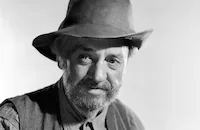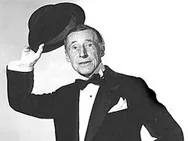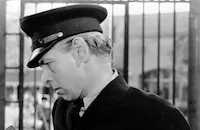The Woman of the Town
Cast & Crew
George Archainbaud
Claire Trevor
Albert Dekker
Barry Sullivan
Henry Hull
Porter Hall
Film Details
Technical Specs

Synopsis
In New York, in 1919, newspaperman William Barclay "Bat" Masterson turns away a collector who wants the gun he once used to "clean up" Dodge City, Kansas. Bat reminisces about the first time he went to Dodge City in the late 1800s seeking a newspaper job: Unable to find editor Inky Wilkinson at his office, Bat seeks him out at the Alhambra, a "honky-tonk" saloon. Inky promises to talk with Bat after finishing his card game, which is ostensibly a meeting of the city council. After a Texan cowboy then shoots Dodge's sheriff over a minor dispute, Bat kills the cowboy in self-defense. Old-timer Buffalo Burns recognizes Bat and regales the locals with Bat's impressive history as an Indian fighter. Bat is immediately appointed the new sheriff, and is charged with protecting the town against rancher King Kennedy's unruly cowboys. Bat's first assignment is to attend church and protect the "proper" women from undesirable persons. While attending the Sunday sermon, Reverend Samuel Small requests that newcomer Dora Hand sing a hymn, and Bat is immediately smitten with her. Bat later learns that Dora is a honky-tonk performer at the Alhambra. Although they fall in love, both Bat and Dora are disdainful of the other's profession. When Reverend Small learns of Dora's profession, he questions the propriety of her singing at church, however, Bat writes an anonymous, eloquent editorial quoting biblical passages and condemning prejudice, and Reverend Small invites Dora to return to church. Respect for Dora grows when she selflessly spends her time caring for a poor, sick child. Bat worries when Kennedy and his large crew of rowdy cowboys come into town, but as King brings a lot of money into Dodge, Bat refrains from arresting him for riding into the Alhambra on his horse, in violation of many law-and-order ordinances Bat has helped to pass. King and Bat soon develop a hostile acquaintance, as King becomes a rival for Dora's affection. Bat warns King to respect the ordinances so that his cowboys will follow suit, and King agrees after Dora's affection softens him. Dora sees a great deal of King, but nevertheless, goes to Kansas City to ask her uncle, the publisher of the Kansas City Clarion , to hire Bat. Dora's uncle, who disapproves of her lifestyle, at first refuses, but changes his mind after she threatens to use her family name as her stage name. In turn, Dora accepts her uncle's stipulation that she will never again come to Kansas City. When Dora returns to Dodge, Bat proudly shows her the job offer, unaware that she is behind it. Dora reluctantly rejects Bat's marriage proposal because of her promise to her uncle. King, who has been incited by a dance hall girl's gossip that Dora is making a fool of him with Bat, demands that Dora marry him, or he will kill Bat. Dora reluctantly accepts King's proposal on the condition that she be allowed to work for the remainder of her two-month contract with Mayor Dog Kelley, who owns the Alhambra. Dog is sensitive to Dora's distress and refuses to let King buy her contract. When King insults Dora's integrity, Dog hits him, and King responds by shooting Dog. Dog's collie attacks King, who shoots the animal and is then arrested by Bat. King is fined $100 and banished from Dodge for thirty days. Buffalo later overhears King's cohorts planning to kill Bat because of a $1,000 reward offered by a duplicitous council member. Buffalo warns Bat, who kills his assassins before they can kill him, and then prepares the town for an anticipated assault by King and his gang. When King returns, he immediately goes to Dog's hospital room to finish him off. During an ensuing gunfight with Bat, King shoots through Dog's hospital door, accidentally wounding Dora. With her dying breath, Dora makes Bat promise to give up his guns. The next day, Bat arrests King for Dora's murder, and everyone attends the funeral of the much-beloved woman. Making good on his promise, Bat buries his guns with Dora.

Director
George Archainbaud
Cast

Claire Trevor

Albert Dekker

Barry Sullivan

Henry Hull

Porter Hall

Percy Kilbride

Arthur Hohl

Marion Martin
George Cleveland
Beryl Wallace
Teddi Sherman

Clem Bevans
Eula Guy
Claire Whitney
Herbert Rawlinson
Hal Taliaferro
Charley Foy
Frances Morris

Russell Hicks
Marlene Mains
Dewey Robinson
Russell Simpson
Wade Crosby
Dorothy Grainger

Glenn Strange
Laddie Jr.
Crew
Ralph Berger
Glenn Cook
Dick Dickson
Henry Donovan
Russell Harlan
Norman Houston
Cecile Kramer
Emile Kuri
Lester Lee
Carrol Lewis
Aeneas Mackenzie
Earl Moser
Jack Noyes
Marshall B. Pollock
Eddie Prinz
Lewis J. Rachmil
Miklos Rozsa
Jerry Seelen
Harry Sherman
Harry Sherman
Irvin Talbot
Travilla

Film Details
Technical Specs

Award Nominations
Best Score
Quotes
Trivia
Notes
The working title of this film was The Gunmaster. According to a Hollywood Reporter news item, producer Harry Sherman changed the title to The Woman of the Town to make the film more attractive to women. Although most reviews list the film as running 87-90 minutes, the Daily Variety lists it as 97 minutes. No further information about the discrepancy in the running times has been found. The name of vaudeville star Eddie Foy was incorrectly spelled "Eddy" in the onscreen credits. Foy was portrayed by his son Charley in the film.
William Barclay "Bat" Masterson (1853-1921) served as sheriff of Dodge City from 1877-1880, and reportedly was a member of the Dodge City Gang, which ran the town. Masterson was associated with other notorious lawmen such as Wyatt Earp and Doc Holliday. In 1902, Masterson became a sports writer for the New York Morning Telegraph. Renowned gossip columnist Louella O. Parsons, portrayed by Beryl Wallace in this film, worked with Masterson when she wrote columns for the Hearst newspapers. Bat Masterson died in 1921. Masterson was a featured character in many Western movies, including the 1947 RKO film Trail Street, starring Randolph Scott and Robert Ryan, directed by Ray Enright (see AFI Catalog of Feature Films, 1941-50); Columbia's 1955 film Masterson of Kansas, starring George Montgomery and Nancy Gates, directed by William Castle; Paramount's 1957 film Gunfight at the O.K. Corral, starring Burt Lancaster and Kirk Douglas, directed by John Sturges; and the television series Bat Masterson, starring Gene Barry as the lawman, which ran from 1959 to 1961.
Paramount publicity noted that the character of "Dora Hand" was drawn from a May 1876 Dodge City newspaper account of the murder of a dance hall girl of the same name. Actor Barry Sullivan made his motion picture debut in the film. Modern sources include Tom London in the cast. The film received an Academy Award nomination in the Music (Music Score of a Dramatic or Comedy Picture) category.












